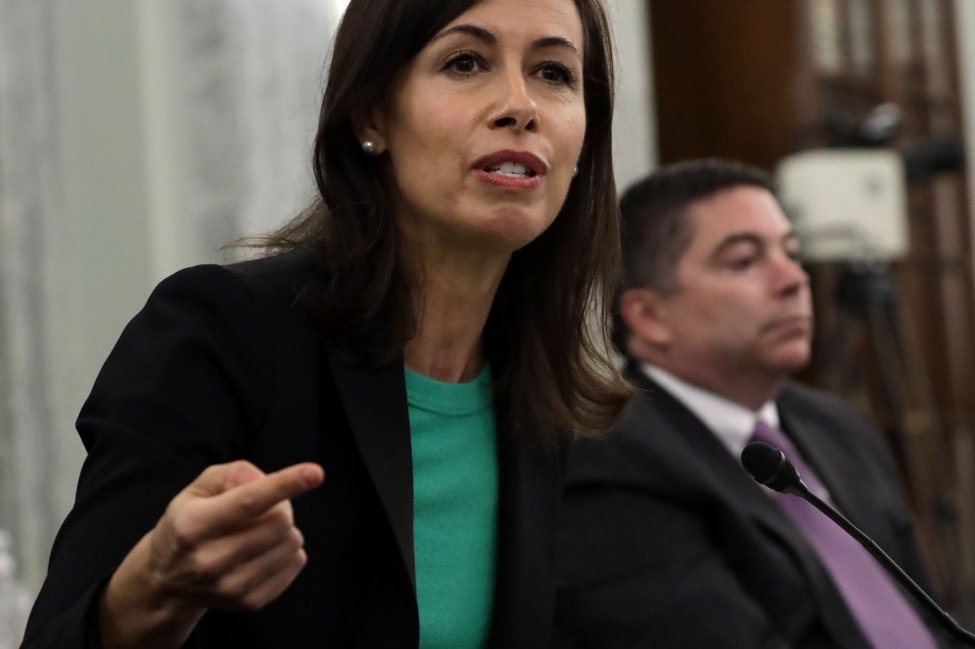Sean Moran is a policy reporter for Breitbart News. Follow him on Twitter @SeanMoran3.
Top News
Exclusive – Senate Commerce Committee Republican Memo Outlines ‘Woke’ Biden Budget Proposals

Senate Commerce Committee Republicans sent a memo that outlines many woke provisions in President Joe Biden’s budget proposal, Breitbart News has learned exclusively.
Commerce Committee Republicans, led by Sen. Ted Cruz (R-TX), outlined some of the budget proposals within the Commerce Committee’s jurisdiction in a memo, obtained by Breitbart News, which was sent to Republicans at the Senate Financial Services and General Government Appropriations Subcommittee.
The memo details how the Consumer Product Safety Commission (CPSC) requested a 39 percent increase in its budget, and Senate Commerce Committee Republicans said they oppose any increase in the CPSC while the agency “continues its blatant, unlawful escapade to ban stoves in the United States.”
Gas stovetop (Géza Bálint Ujvárosi/EyeEm)
The memo states, “With that understanding, the CPSC brazenly requests additional funding to hire 22 additional staff to investigate ‘new, existing, and hidden’ hazards, including ‘chronic hazards,’ which is the exact language the CPSC uses to describe its ongoing review of gas stoves.”
The Biden budget for the CPSC would also hire four more employees to advance diversity, equity, and inclusion (DEI) at the agency. Commerce Committee Republicans said the agency should not waste taxpayer dollars on DEI to advance “undefined workforce ‘equity.’”
Memo to FSGG Appropriations by Breitbart News on Scribd
The Biden budget requests a 37 percent increase for the Federal Trade Commission (FTC) and said that any additional funding should be considered since the FTC, in its current state, is going down “an alarming path of regulatory activism and regulatory activism and overreach.” Cruz and committee Republicans noted that former Republican FTC Commissioner Christine Wilson resigned to prevent giving FTC Chair Lina Khan “any further hint of legitimacy by remaining.”

Lina Khan, nominee for Commissioner of the Federal Trade Commission (FTC), speaks during a Senate Committee on Commerce, Science, and Transportation confirmation hearing, Wednesday, April 21, 2021, on Capitol Hill in Washington. (Graeme Jennings/Washington Examiner via AP)
Republicans found that the FTC could save money by focusing less on “overreaching” legal theories” that would not likely survive in court:
The Committee believes the FTC could achieve significant cost savings and use its current resources effectively if it simply refused to prioritize cases that seek to advance overreaching
legal theories that are unlikely to be sustained in court. Instead, the FTC should focus on enforcement actions that prioritize protection of the American consumer and encourage
competition in the marketplace. For these reasons, the Committee does not support the Commission’s request for a budget increase.

Federal Communications Commission (FCC) Chair Jessica Rosenworcel (UPI)
Federal Communications Commission (FCC) Chair Jessica Rosenworcel called for more funding for the Affordable Connectivity Program (ACP), a program created to subsidize broadband service for low-income Americans during the coronavirus pandemic. Commerce Committee Republicans believe the ACP is riddled with waste, fraud, and abuse and failed to increase broadband access for low-income Americans:
The Government Accountability Office (GAO) and the FCC’s Office of Inspector General (OIG)have issued multiple warnings about widespread fraud in the ACP. On January 18, 2023, the GAO released a report revealing that the ACP is not effectively detecting fraud. The report found the program’s enrollment database had duplicate subscribers (over 2,500), partial or mismatched Social Security numbers (874,000 or over 10%), subscribers allegedly receiving fixed broadband at post office and commercial mailboxes, subscribers with broadband providers’ retail locations as their primary or mailing addresses, and missing or invalid address information (over 289,000 with missing secondary address information and over 514,000 with invalid secondary address information).
Further, on September 8, 2022, the FCC’s OIG sent an advisory regarding a scheme where the same qualifying child’s information was being used to fraudulently enroll households in the program. The most egregious example identified in the advisory was that more than 1,000 Oklahoma households were enrolled based on the eligibility of a single benefit qualifying person, a 4-year-old child who receives Medicaid benefits. Failures on the part of the FCC may be to blame for this rampant abuse; according to a recent letter from the FCC OIG, the FCC, “failed to implement several important recommendations intended to enhance and safeguard the integrity of the [subsidies].
In addition to fraud, data so far suggests that the program has been ineffective and that the vast majority of tax dollars have gone to those who already subscribed to broadband prior to receiving the subsidy. Earlier this year, for example, the FCC reported that in surveying ACP recipients only 16% of respondents indicated they had no internet subscription prior to subscribing with ACP dollars. The CEO of a broadband provider that is the country’s largest recipient of both EBB and ACP funds recently confirmed that “[t]he vast majority of the [ACP] customers we have were already existing customers who are now benefiting from that benefit.” Simply put, through ACP, taxpayers are predominately subsidizing people who were already buying Internet on their own dime. Therefore, the Committee urges you to reject any requests for additional funding for this program at this time.
The memo concludes, “For the above reasons, Ranking Member Cruz asks the U.S. Senate Financial Services and General Government Appropriations Subcommittee to reject the aforementioned administration requests when crafting the FY 2024 appropriations bill.”
Read the full article here

-
Uncategorized6 days ago
The Surge of Crypto Slots: A New Period in Online Pc Gaming
-
Uncategorized6 days ago
Kəşf Etmək Binance Coin Kazino Saytları Dünyasını
-
Uncategorized6 days ago
The Increase of Dogecoin Casino Sites: An Extensive Introduction
-
Uncategorized6 days ago
High Roller Online Casinos: Inside the Globe of Elite Betting
-
Uncategorized2 days ago
The Comprehensive Overview to Tutoring Networks







